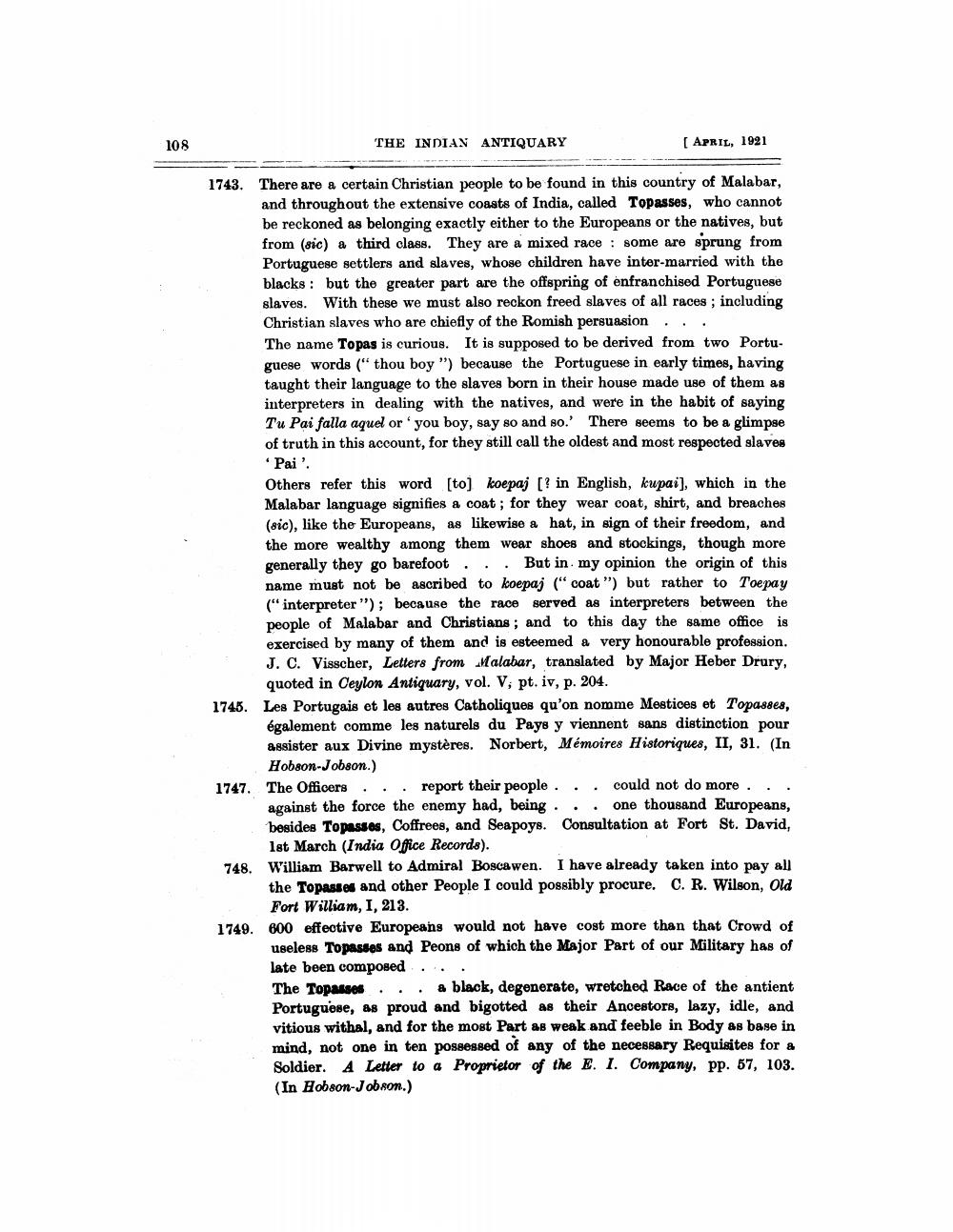________________
108
THE INDIAN ANTIQUARY
APRIL, 1921
1743. There are a certain Christian people to be found in this country of Malabar,
and throughout the extensive coasts of India, called Topasses, who cannot be reckoned as belonging exactly either to the Europeans or the natives, but from (sic) a third class. They are a mixed race : some are sprung from Portuguese settlers and slaves, whose children have inter-married with the blacks : but the greater part are the offspring of enfranchised Portuguese slaves. With these we must also reckon freed slaves of all races; including Christian slaves who are chiefly of the Romish persuasion... The name Topas is curious. It is supposed to be derived from two Portuguese words (“thou boy ") because the Portuguese in early times, having taught their language to the slaves born in their house made use of them as interpreters in dealing with the natives, and were in the habit of saying Tu Pai falla aquel or you boy, say so and so.' There seems to be a glimpse of truth in this account, for they still call the oldest and most respected slaves
Pai'. Others refer this word [to) koepaj [? in English, kupai), which in the Malabar language signifies a coat; for they wear coat, shirt, and breaches (sic), like the Europeans, as likewise a hat, in sign of their freedom, and the more wealthy among them wear shoes and stockings, though more generally they go barefoot ... But in my opinion the origin of this name must not be ascribed to koepaj (“coat ") but rather to Toepay ("interpreter"); because the race served as interpreters between the people of Malabar and Christians; and to this day the same office is exercised by many of them and is esteemed a very honourable profession. J. C. Visscher, Letters from Malabar, translated by Major Heber Drury,
quoted in Ceylon Antiquary, vol. V, pt. iv, p. 204. 1745. Les Portugais et les autres Catholiques qu'on nomme Mestices et Topasses,
également comme les naturels du Pays y viennent sans distinction pour assister aux Divine mystères. Norbert, Mémoires Historiques, II, 31. (In
Hobson-Jobson.) 1747. The Officers.report their people... could not do more...
against the force the enemy had, being... one thousand Europeans, besides Topassos, Coffrees, and Seapoys. Consultation at Fort St. David,
1st March (India Office Records). 748. William Barwell to Admiral Boscawen. I have already taken into pay all
the Topasses and other People I could possibly procure. C. R. Wilson, Old
Fort William, I, 213. 1749. 800 effective Europeans would not have cost more than that Crowd of
useless Topasses and Peons of which the Major Part of our Military has of late been composed . . . The Topasses... a black, degenerate, wretched Race of the antient Portuguese, as proud and bigotted as their Ancestors, lazy, idle, and vitious withal, and for the most part as weak and feeble in Body as base in mind, not one in ten possessed of any of the necessary Requisites for a Soldier. A Letter to a Proprietor of the E. 1. Company, pp. 57, 103. (In Hobson-J obron.)




